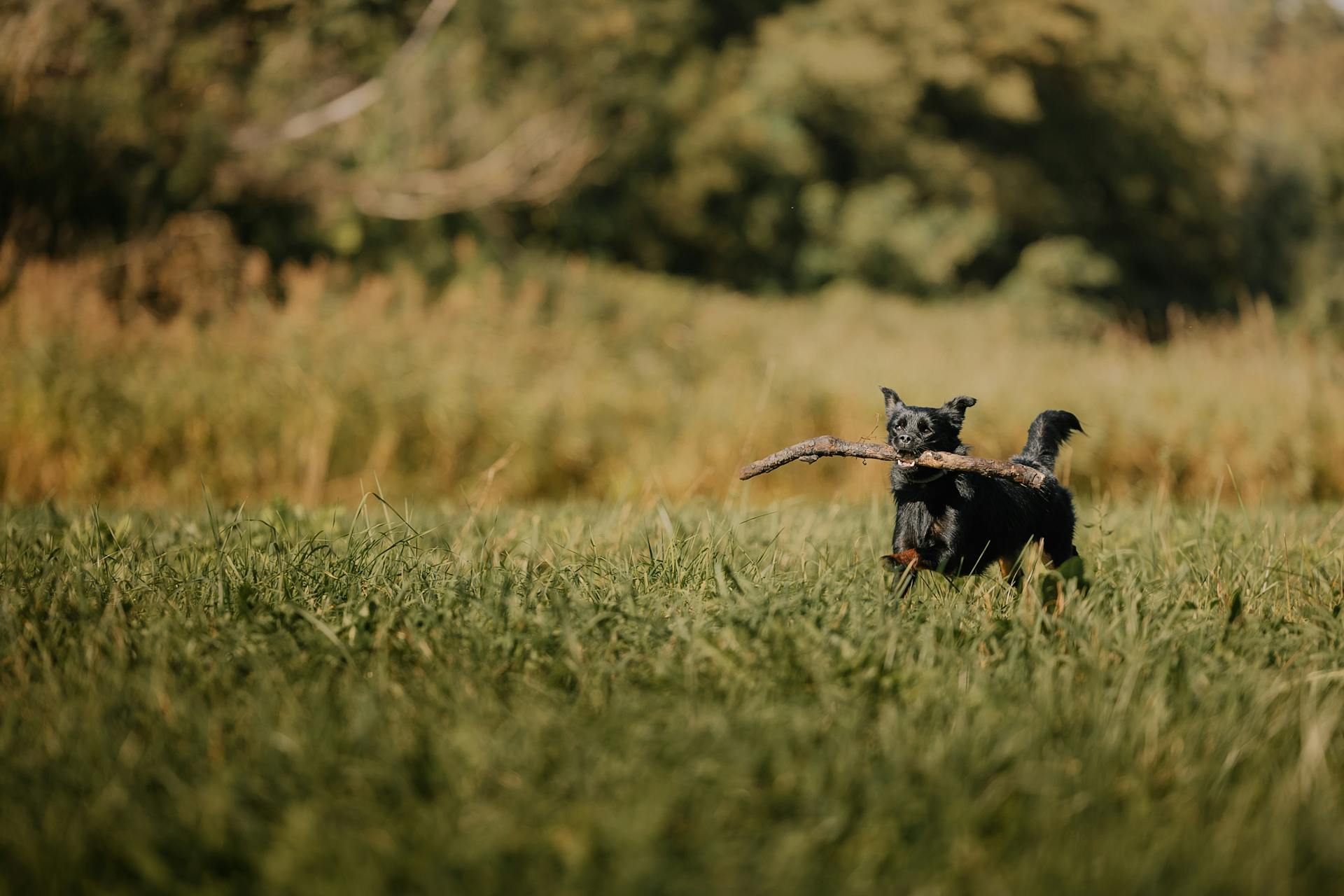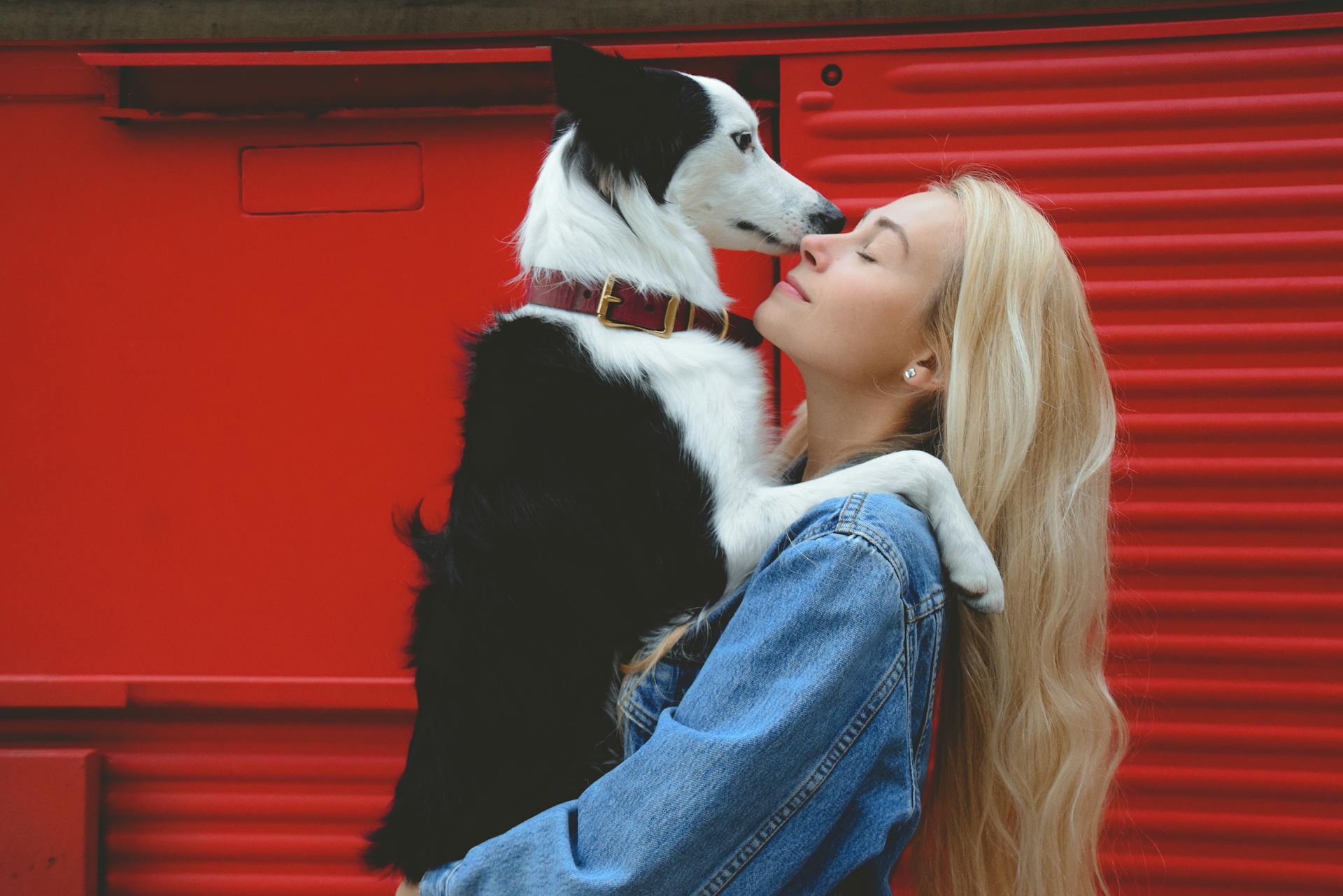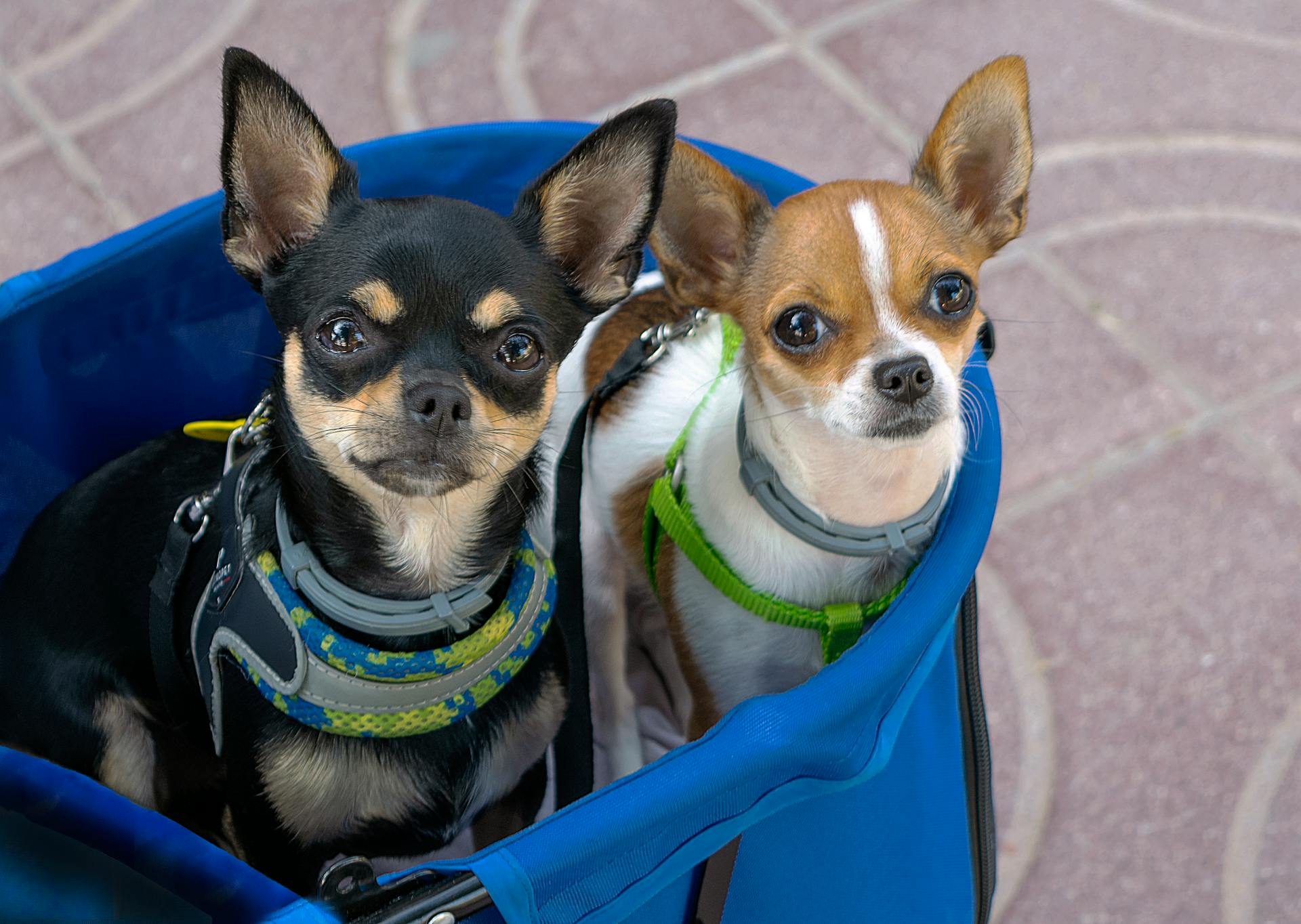
Dogs need social interaction to prevent boredom and loneliness. In fact, a study found that dogs left alone for extended periods can experience separation anxiety, leading to destructive behavior.
Dogs that are left alone for too long can also suffer from mental health issues, such as depression. A study on canine depression found that dogs that don't receive enough social interaction are more likely to develop this condition.
Dogs that have a companion to play with and interact with can reduce their risk of boredom and loneliness. This is because having a companion provides them with a built-in playmate and social partner.
Having a companion can also help to reduce the risk of destructive behavior in dogs. In fact, a study found that dogs that have a companion to play with are less likely to engage in destructive behavior when left alone.
For more insights, see: Dog Play Groups
Benefits of a Companion
Having two dogs can be a game-changer for your health and well-being. Owning one dog is a great way to reduce stress, reduce blood pressure, and foster positive health, but having two dogs can amplify these benefits.
Reducing cholesterol and combating feelings of loneliness are just a couple of the many advantages of having two furry friends. Owning two dogs can help keep you active, too.
Leaving your dog alone can be tough, but having two dogs can help alleviate this issue. Two French bulldogs, for example, can keep each other company in your absence, helping to reduce feelings of loneliness.
Having two dogs can also help with exercise, as they'll play with each other regularly, getting some of their energy out.
Choosing the Right Companion
Dogs are pack animals and benefit from having a companion, especially if they're social breeds like French bulldogs.
Some dogs are naturally more social than others, and they'll welcome a new dog into the family with open arms. Consider your dog's breed and personality when deciding whether they need a companion.
Your dog's behavior around other animals is crucial to consider. If they're friendly with cats, a feline sibling might be a great match. However, if they tend to chase or lunge after cats, it's best to avoid getting one.
Intriguing read: Good Companion Dogs
Here are some factors to consider when choosing the right companion for your dog:
Ultimately, the right companion for your dog will depend on their individual needs and personality.
The Right Kind
Choosing the right companion for your dog can be a daunting task, but by considering a few key factors, you can make an informed decision.
First and foremost, think about your dog's size and your home's space. Can your home fit a second dog? Will your current dog be able to interact with a puppy, or will an older, more calm dog be best?
You should also consider your lifestyle and whether you have time to play with and care for another dog. Can you afford to take care of a second dog? These are all crucial factors to consider before bringing a new furry friend into your home.
Here are some factors to consider when choosing the right companion for your dog:
Pet Species
Choosing the right companion for your dog depends on the species of pet you're interested in. Many dogs love having another dog to play with, especially if they had good socialization early on.
Dogs and cats can have a wide range of interactions, from mortal enemies to BFFs. It's possible for a small dog and a large bird to get along better than a large dog and a small bird.
Some reptile species, like bearded dragons, are generally calm and sociable, making them better companions for dogs. However, snakes like rosy boas and ball pythons are very skittish and may strike in fear.
Every dog is different and will interact with a cat, bird, or large reptile in their own way. A puppy who develops social relationships with other dogs and species during their critical socialization period is less likely to be fearful or aggressive.
For more insights, see: Merrick Dog Food for Small Dogs
Introducing a New Companion
Introducing a new companion to your dog can be a daunting task, but with some careful planning and execution, it can be a successful experience for both dogs. It's essential to choose a neutral location for the first meeting, such as a quiet park or green space, to prevent territorial aggression.
The first meeting should take place outside the house, where both dogs can be walked separately and at a distance initially. This allows them to become familiar with each other's scents and sounds without feeling threatened or territorial. A successful introduction will go a long way towards a good relationship between your dog and their new sibling.
To ensure a smooth introduction, it's crucial to let them interact in their own time. Don't rush the process, and allow your dogs to approach each other at their own pace. Reward calm behavior with treats, and pay attention to body language for signs of stress or unease.
Here are some key things to keep in mind during the introduction process:
- Introduce them on neutral territory.
- Let them interact in their own time.
- Use treats to reward calm behavior.
- Pay attention to body language for signs of stress or unease.
After a successful introduction outside, it's essential to continue supervising at home to prevent potential conflicts over resources or space. Make sure there are no toys or food lying around, and that there are multiple beds and water bowls throughout the house to prevent potential fights.
Considering Another Pet
Considering Another Pet can be a big decision, and it's essential to think about how it will affect your current furry family member. Getting a second dog could make your first dog feel displaced and uncertain.
Your first dog may not be happy having to share their toys, space, territory, or even their owner's affection. This makes it important to prepare and do your research when getting ready to bring home a second dog.
Some dogs will get along well with their new sibling, but others may not. It's crucial to consider your first dog's personality and temperament before introducing a new pet to the household.
Is My Lonely?
Dogs are social creatures that descended from wolves, and they value companionship just like humans do. This means they can get lonely when left home alone or not getting enough attention.
Following your dog around is a common sign of loneliness. This behavior is likely because your dog is seeking companionship and attention.
Exhibiting destructive behavior is another sign of loneliness in dogs. This could be due to boredom or a lack of stimulation.
Licking themselves repetitively is a self-soothing behavior that can be a sign of loneliness. It's as if your dog is trying to calm themselves down.
Sleeping more than usual can also be a sign of loneliness in dogs. This could be because they're not getting enough mental and physical stimulation.
Becoming uninterested in playtime or food is a significant sign of loneliness in dogs. This is a clear indication that something is wrong.
Here are some common signs of loneliness in dogs:
- Following you around
- Exhibiting destructive behavior
- Licking themselves repetitively
- Sleeping more than usual
- Becoming uninterested in playtime or food
It's essential to take your dog for a checkup if you notice any of these signs, as they can also be associated with depression caused by an underlying condition.
Frequently Asked Questions
Is it okay to have only one dog?
Yes, it's okay to have only one dog, as long as they receive proper care and attention. However, introducing a second pet requires special consideration to ensure a harmonious household
Are dogs happier with a second dog?
Dogs can be happier with a second dog, but a second dog won't replace the attention and care they need from their owners
Do all dogs need a companion dog?
Most dogs (95-98%) benefit from having a companion dog, but it's not a one-size-fits-all solution and some dogs may prefer to be solo pets.
Sources
- https://www.keendogtraining.com/blog/working-dogs-vs-companion-dogs-what-s-the-difference
- https://poeticfrenchbulldogs.com/are-two-dogs-better-than-one-why-your-frenchie-needs-a-companion/
- https://www.spinnakervetclinic.com/site/blog/2022/07/30/second-dog
- https://wagwalking.com/wellness/should-i-get-another-pet-for-my-dog
- https://yourcaninecoach.com/does-my-dog-need-a-friend/
Featured Images: pexels.com


